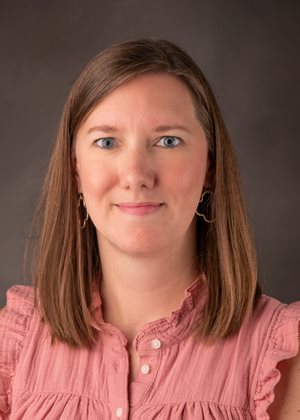Eaves, an associate professor of political science and policy studies, shares how research and time as a fellow has made an impact in helping students become active citizens.
As the faculty fellow for civic engagement, Carrie Eaves’, associate professor of political science, passion for understanding the nuances of elections and voter engagement has had a ripple effect in the landscape of civic engagement at Elon. Eaves’s unique perspective and expertise illustrate the natural intersectionality and progression between political science and election engagement.

“I am really able to merge both my disciplinary expertise and my service efforts on campus. I am able to make decisions and help guide our best practices based on scholarship about what’s happening in elections and how to better get people engaged. I’m certain that other people on campus could also do this work, but I bring a research-based connection to the work,” Eaves said.
Her research while in graduate school focused on the U.S. Senate elections, highlighting the 17th Amendment, which established the direct election of senators by the citizens of the United States. She examined 100 years of U.S. Senate elections, studying trends in who runs, how they run their campaigns and who wins.
“I spent a lot of time and training thinking about Senate elections in particular and how they’re different from House elections or governor’s races. So elections have really always been the part of political science that I’m the most interested in,” Eaves said.
Drawing upon her research and unique perspective, she plays a pivotal role in guiding civic engagement initiatives at Elon, supporting faculty, staff, students and the greater Elon community. When working with students, Eaves partners with Kernodle Center for Civic Life and Elon Votes! to increase voter turnout and education. She shared about the impact of the partnerships and affirmed the influential role of partnerships and peer-to-peer encouragement in driving impact.
“In 2020, the students were really put to the test when we were all sent home. All of our plans were distanced and many of the in-person gatherings were canceled,” Eaves said. “But the team did such great work, and we had tremendous growth in our voter turnout in 2020. There’s research that shows it’s more impactful when your peer tells you to vote. Seeing those seeds that were planted and then spread amongst the students has been really impactful.”
By comparison, when supporting civic engagement when it pertains to faculty and staff, she emphasizes the importance of the impact of faculty and staff on students, as they serve as an example, shaping a blueprint for civic engagement.
“I think we’re modeling for students being engaged in our communities, seeking to make them better places and being good active citizens. Students are watching what we do and how we engage. So just setting an example for them is really important,” Eaves said.
Eaves believes that faculty and staff are tasked with helping students build a path to being lifelong engaged citizens, which includes encouraging habits, such as voting, that would aid in these behaviors.
“There is research that suggests if you start voting young and make voting a habit, then you will vote every time the polls are open,” Eaves said. “Students are at this moment where they are just now able to vote, most students have just turned 18. This is the moment when they’re first able to really actively engage in the political process. So we want to do all that we can to make it easy and understandable, accessible for them, and set them on a path to be lifelong voters.”
Though voter engagement and voter education are major behaviors that encourage civic engagement, there are also different ways for students to engage. For example, volunteering, going to school board meetings, and advocating for topics.
Currently, Eaves is working with campus partners to prepare for this year’s elections with the goal of encouraging student engagement and participation, especially in local elections.
“We have important races here in Alamance County and Elon has become a leader in the area in hosting these candidate forums. Sometimes there’s not a lot of information about local candidates. So it’s important to think about the national level and then it’s also really important to think about helping people be informed and make their best choice here in our local elections,” Eaves said.
Looking ahead, Eaves will finish her fellowship this spring. However, she is hopeful that the next faculty fellow for civic engagement will continue the work and partnership that will enhance student voter engagement.


